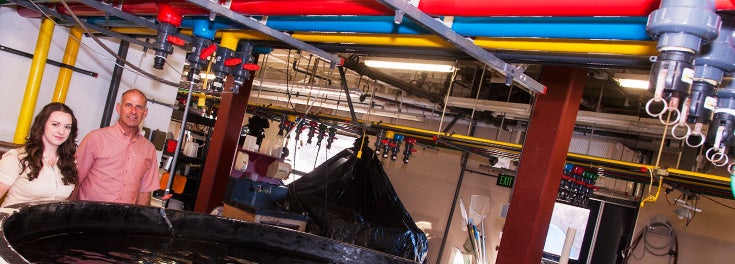
The University of Rhode Island’s location on the New England coastline brings a whole set of benefits. Among them: surfing, beaches, sailing, and a Marine Science Research Facility that can emulate nearly any ocean condition on the planet. Our researchers and students never have to choose between the expense of conducting research at sea, and the complexities of replicating ocean conditions in a laboratory. The high-tech, high-powered pumping system at the Marine Science Research Facility makes both possible.
Our researchers and students never have to choose between the expense of conducting research at sea, and the complexities of replicating ocean conditions in a laboratory.
Located at URI’s Narragansett Bay Campus, the Marine Science Research Facility is one of the most versatile seawater facilities in the country, and the largest of its kind in New England. “We can manipulate the water to be whatever temperature, salinity, or filtration researchers may want. We can chill the water, heat the water, filter out the plankton and other particulates in the water, or leave it unfiltered,” said Marine Research Associate Ed Baker, who manages the lab.
Every day, students and researchers feed and care for marine life and conduct experiments in 7,000 feet of indoor wet lab space, and almost unlimited outdoor space adjacent to the bay. A maze of brightly color-coded pipes carry filtered, heated, chilled, and ambient seawater to tanks in several buildings.
Like sharks? You might use the laminar flow tank, described as “a wind tunnel with water,” to study the biomechanics of swimming and feeding behavior. If you were a member of URI’s team, recently back from studying krill in Antarctica, you could keep your samples in polar conditions while continuing your research here in Rhode Island. Interested in how climate change affects invertebrates? Use our tanks to adjust for any temperature you need.
“In the marine environment, temperature is fundamentally important, so we have environmental chambers that can control temperature in a very narrow range,” said Danielle Duquette, assistant manager of the facility. “One degree can be a huge deal; it might mean an entire fish population moves north. Temperature affects metabolism, physiology, reproduction and survival.”
The facility is so unique that it’s used by the Rhode Island Coastal Resources Management Council to study invasive species. Brown University researchers use it to study algae blooms as a proxy for historical temperatures in the bay. Scientists at the New Bedford School for Marine Sciences and Technology use it to study how feeding ration affects isotopes in the shells of scallops, as does a Rhode Island College professor who’s studying the effects of toxins on skate development.
If studying marine life is your big idea, well, you can cover the whole world’s oceans from right here. Welcome to the University of Rhode Island.
Pictured above: Marine Research Associate Ed Baker and Assistant Manager Danielle Duquette at URI’s Marine Science Research Facility
Related Link:
